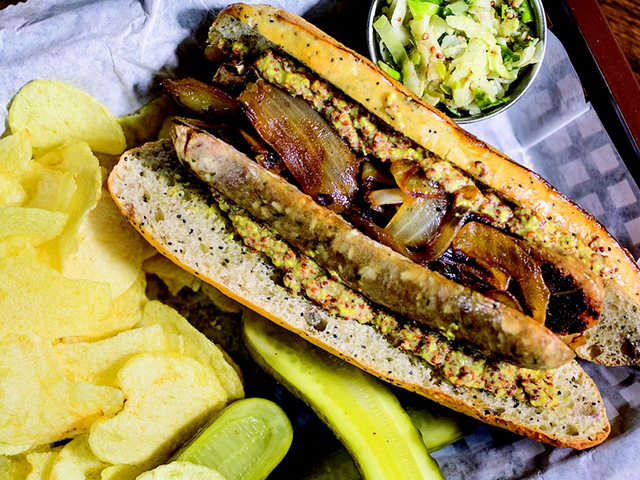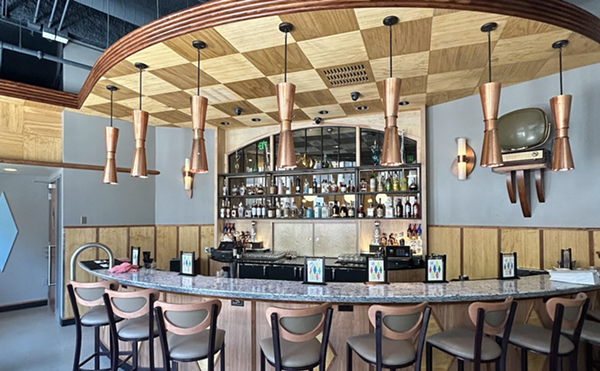Full disclosure: I’ve known Steve Hrnjak (HURN-yak) for about 30 years. Not continuously, but we knew each other in high school and reconnected via Facebook. That’s where I learned he was a hardworking chef who’s just broken away from the corporate gigs he’s done in the past. He says, “I just couldn’t take the corporate mindset, where pennies are more important than people.” Now he has an enjoyable gig at what he calls “an upscale ethnic cultural center,” a place he’s much happier to be.
Talk with Hrnjak for a minute or two about working in kitchens and you’ll soon learn he’s witty, profane, insightful, and very free with solid opinions based on decades of work as a cook. Here’s our conversation from last week:
MT: You’ve been cooking for how long?
Hrnjak: Thirty-three years — I started when I was 15. I don’t have a culinary degree. I went to school for computer science, web design, media, art history, photography, psychology, physics; that was all in there. Everything adds up to this because my passion has always been food, and it doesn’t matter whether I’m cooking a coney dog or I’m putting together some cocoa-nib-espresso-rubbed lamb chops for a bank president.
MT: Is this where you say culinary school is a bunch of BS?
Hrnjak: I’m not gonna say, “Don’t go to school,” because you have to learn the fundamentals. In the same respect, I’ve gotten guys from Johnson & Wales [University] coming into my kitchen and showing off with fancy colors on their chef coats — and you ask them to make a simple Hollandaise for you and you’d be surprised at how they have absolutely no skills whatsoever. Then you got a cat that’s worked at a bar his whole life or in a crap restaurant as a prep cook, and his knife skills are sick: He can put out 200 pounds of potatoes in 20 minutes — diced, quartered, washed, and ready to go. School is important, but the main thing in culinary is getting the finesse points down — doing it right, taking your time. It doesn’t matter what you’re cooking — you could be cooking a beef stew or you could be cooking the highest-end food ever — you have to put the same amount of love into it. It’s obvious when you don’t.
MT: What don’t you learn in culinary school?
Hrnjak: Maybe I’m wrong, but they don’t teach “spin” — and spin is something every single person who’s been thrown on a hot line has experienced, whether working the broiler or burners or even being the fry cat. Whatever board you’re working on, you see tickets flying and they’re on the floor and you have some clown screaming at you to get that order up and you have nothing written — it’s all in your head. You’re being yelled at to get the shit up there, it’s a Friday night, and you have 115 covers all waiting on food: At that time, you either have to go smack the guy in the forehead with a skillet and tell him to wake the fuck up, run over there and take his position over, or coax him through. I’ve been through spin before; spin is where you look at what you have and completely forget where everything is and you don’t know what you’re working on anymore. It’s just gone; everything that you knew is gone. You can regain it eventually; over time, you just become the biggest badass ever. It’s second nature to you. I think every great chef has to come through the ranks of working in the shithole. Being a chef isn’t just learning how to cook with nitrogen and making food out of paper.
MT: It’s different from the way it looks on television.
Hrnjak: Kitchens are sharp, hot, pointy, slippery, and full of attitude. A chef goes through more hell, but that’s the thing: It still has to be done right. You weed out the garbage; the shitty guys end up at some shitty restaurant putting out shitty food for the rest of their lives; the badasses who really give a fuck actually move on.
MT: But even a high-end kitchen isn’t what it used to be, right?
Hrnjak: I remember some chefs in the Birmingham area that were getting suites in hotels and Mercedes Benzes and $100,000-a-year paychecks. The bottom fell out in 2006, if my memory serves me correctly. People started losing jobs, no one had enough money to do a $30,000 baby shower anymore. Soon enough, instead of having an executive chef, an executive sous, three sous, and all the other cooks and everything else that go in the brigade, you’re suddenly down an executive chef, maybe a sous chef, and a bunch of low-paid cooks. So what happened was, there were a lot of chefs in Michigan. So many dudes that were executives before at golf clubs, country clubs, hotels, etc., were making fat scratch — and when people aren’t buying $200,000 weddings, $30,000 showers, or just having a dinner for two grand, that money’s not coming in. All of a sudden, when a place needs a chef, you’ve got a chef going, “Dude, I’ll totally take that job for $35,000 a year,” whereas it was maybe a $60,000 a year job before. Then, the other guy comes and says, “Well, shit, I really need this job. I’ll do it for $32,000.” So what happened was, the directors of all these places realized that the chef wage isn’t what it should be, and now chefs in Michigan are being taken advantage of. Obviously, I think there are a bunch of chefs who are making fat loot, but it’s fewer and more far between. I make enough to support a family, but I’m not close to being secure, and I work at a nice place and I put out a nice product, you know what I mean?
MT: It’s odd that this is happening even as TV chefs become celebrities.
Hrnjak: Totally. The trippy bit about it is, with social media and with cable TV cooking channels, chefs became superstars. Now chefs can have tattoos. Chefs can be cool and rugged and whatnot. But a lot of those assclowns on TV, they don’t know what they’re talking about.
MT: Well, what’s the reality of life as a chef?
Hrnjak: People don’t get what chefs go through. We’re getting divorced, we’re doing drugs, we’re drinking constantly, we’re not sleeping, our hair is falling out, and when we do get divorced, we’re having horrible sexual relationships with chicks who aren’t any better than we are. It’s not as glamorous as everybody thinks it is. Chefs are everyday people trying to eke it out, and you’ll find people like me throughout the shit, throughout the hell.
MT: What makes all that worth it?
Hrnjak: Guest satisfaction is the whole thing. If I’m serving some dude macaroni and cheese and he’s expecting a nice dinner of macaroni and cheese, and I’ve given him that awesome macaroni and cheese where this cat goes, “Dude, that was the best fucking macaroni and cheese that I ever ate in my life!” that makes my day. That shit actually means something to me, and maybe not to everybody else. People are gonna think after reading this that it’s just a pile of bullshit, but it’s the truth. I give a fuck. That’s why I get jobs and get to keep jobs because people know that, you know what I mean? I strive for it.
MT: And not all chefs feel that way?
Hrnjak: It kills me: these chefs wandering around with their air of superiority, and their tight pants, and their fuckin hairdos — all this shit — wandering around the dining room while people are eating. It’s like, “Dude, if you’re a fucking chef, you’re in the back sweating, stinking it up with the rest of those assholes back there.” That’s how your crew respects you. My arms are full of suds at the end of the day; I have bleach burns and deep-fryer-oil burns. It’s not glamorous at all: you’re sweating and you’re swearing and you’re dealing with numbskulls. It’s all part of it, man.
MT: But you love it?
Hrnjak: Having a job that you really, really love is essential to your happiness. When you have a job, 60 percent of your life is that job. It’s where you earn your money to pay all of your bills, it’s where you spend half your day — whether you’re there or not, you’re still thinking about it. In my corporate gig, I was doing 90-hour shifts. I kept that shit to myself, but for my salary, believe me, man, they were killing me, dude. They stole my soul for real. When a place makes you want to not do what you love to do, when a place makes you throw your phone out the window because the alarm is reminding you that you have to get up and go to hell, it’s the worst. I think it killed my marriage. Leaving that corporate environment to having my own freedom again was exhilarating, and it totally gave me a new look on life. I’m not stressed in the slightest anymore. I like doing this. The whole trick is to make everybody happy, because you know how people are: Bad news spreads faster than good news, and you’re only as good as your last pork chop.





